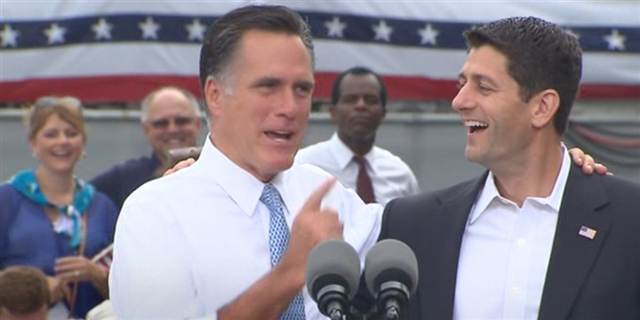How Did Paul Ryan Do In His Big Debut?
Mitt Romney unveiled Wisconsin Congressman Paul Ryan as his running mate this morning.
The Obama and Romney campaigns will spend the next few days trying to define Paul Ryan. In this article, my goal is not to join that fray. Rather, my focus in this post will be to analyze how Mr. Ryan did in his inaugural speech.
In his first speech as a vice presidential nominee, Mr. Ryan struck me as inherently relatable. I suspect many other people will see him as a “real person,” something that stands in marked contrast to Mitt Romney’s more restrained and stiff persona.
That amiability shouldn’t be underestimated. As Democrats spend the next few days trying to demonize Ryan as a reckless cost-cutter, Independent and Republican voters may experience a bit of cognitive dissonance, trying to reconcile the “scary” person his opponents say he is and the friendly person they see on their television screens.
That said, there were some flaws in Mr. Ryan’s speech.
First, he looked so excited at certain points, that he could barely contain himself while delivering rather serious lines. His facial expressions almost had a subtext that read: “I can’t believe I’m here!” That’s understandable and can be forgiven. But as a result, his speech felt disconnected in parts. (As a small example, at one point, he mentioned knowing things in our hearts and heads. As he said “heads,” he pointed to his gut.)
Second, Ryan sounded like he was reading his speech. He focused too much on elocution, and his gestures felt far too prescribed. As a result, he didn’t make enough of a genuine connection with his audience. The skill, even for scripted speeches, is to at least sound spontaneous and in the moment. Ryan didn’t.
Because he sounded like he was reading, Mr. Ryan undercut one of his greatest strengths – his relatability.
As a presentation trainer, here’s my advice to Mr. Ryan:
You’re not a great big stage speaker yet. However, when I’ve seen you speak without notes in front of you, you’re much more natural. So look for ways to incorporate extemporaneous moments into your speeches, even scripted ones. For example, there’s no reason you should need to look at notes when discussing your father’s premature death. Leave your notes behind, and just talk.
Try to apply the same tone you use in those extemporaneous moments to the scripted sections. Don’t try to deliver each word perfectly. In fact, when you practice, put your script away and try making each point in your own words. Replace some of the words in your script with the words you come up during your practice. When your words more closely resemble the way you actually speak in everyday conversation, you’ll deliver them more authentically.
Overall, Mr. Ryan did fine. A seven on a ten scale. He didn’t electrify the crowd, but he didn’t even come close to embarrassing his ticket. Now that he’s passed his first test as a nominee (no Dan Quayle, he), he’ll have plenty of opportunities to continue improving.
What do you think? Please leave your thoughts in the comments section below.

At times, Ryan sounded as if he was reading a speech he did not write and barely read ahead of time. Reminds me of GHW Bush reading remarks in the Rose Garden — he rarely hit the intended emphasis (but at least he didn’t read the stage-direction notations too often). Today, Virginia’s governor’s warm-up remarks was in the style I think Ryan should have used today.
I enjoyed reading this very relevant and timely review. Nice job!
God bless,
Alvin
Ryan is speaking in Manassas now, and he already has hit his stride. He barely looks down on the lecturn at notes.
Nice critique – very balanced.
Thoughtful and relevant advice. Thank you!!
Nice professional tips for Mr. Ryan. The good thing is, while we have been glutted with continual empty speeches given by a gifted READER for almost 5 yrs in all now. We now have the opportunity to hear sincere speeches from a gifted American servent.